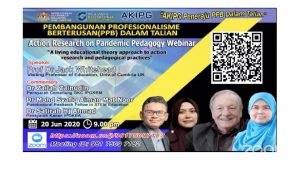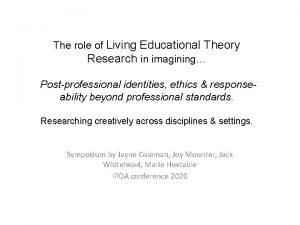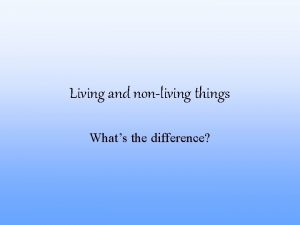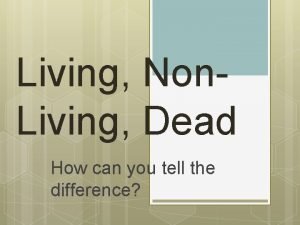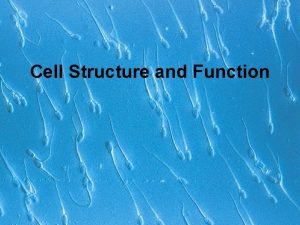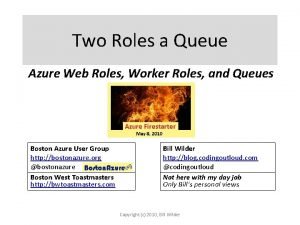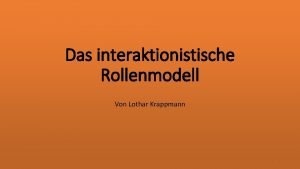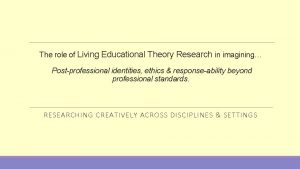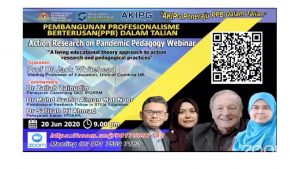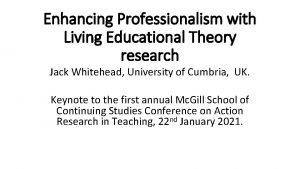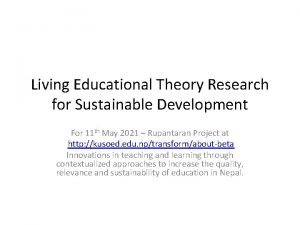The role of Living Educational Theory Research in







- Slides: 7

The role of Living Educational Theory Research in imagining… Post-professional identities, ethics & response-ability beyond professional standards. RESEARCHING CREATIVELY ACROSS DISCIPLINES & SETTINGS

Living Educational Theory Research • Centred within the pursuit of answering the age-old question ‘how can I improve my practice? ’, and committed to providing power to the ‘I’ within this statement. • Supports consideration of how an individual’s values and beliefs can influence their interaction with their own practice, with their students’ learning and with wider society. • It provides the individual the opportunity to create knowledge by supporting them to identify and reflect upon the intrinsic influencers upon their practice and development, but also opens up for the individual the prospect of contributing to the knowledge base within their field of practice. ‘a values-driven education research genre…[encouraging] research from within educational practice’ (1).

Symposium Threads • Professionalism • Educational Responsibility • Educational Communities & Conversation. ‘Within Living Education Theory Research I am supported as part of a diverse learning community, which promotes scholarly discourse and educational conversation, to engage critically and creatively with my developing professional practice’.

Professionalism • Defining professionalism can be difficult as it can be ‘fluid, changing dynamically, with changing contexts…this creates a dynamic tension…as it is both an extremely personal, internalised belief, whilst being very much situated in the immediate environment’ (2). • My own professional development has led me to a different occupational context, where it has been challenging to undergo individual educational professionalisation, extra to meeting my commitment to maintaining physiotherapy practice standards. I recognise my professional identity and professionalism as a balance of intrinsic and extrinsic factors, and seek harmony in their changing interactions. • J. Mounter's exploration of ‘Living Professionalism’ is synonymous with this as she offers an active consideration of professionalism which isn’t static, but which has motion as practitioners move in pursuit of their continuing professional development beyond practice standards by accepting Professional Responsibility. (Quote? )

Educational Responsibility • I propose that educational responsibility could be defined as: a duty to teach, train and learn, to improve knowledge and develop skills, whilst accepting accountability for the consequences of doing so. • The writings of M. Huxtable and J. Whitehead (2017) further recognise the ‘living’ and ‘evolving’ nature of educational practice, but also outline the responsibilities of professional educator practitioners; ‘…to continually inquire into their practice to learn how to improve it…to contribute to, and draw on, an educational knowledge-base’ (3). • Through Living Educational Theory research I have been able to recognise my educational responsibilities, whilst also being supported and equipped with the skills and ability to respond to them as part of an educational community.

Educational Communities & Conversation ‘one of the distinctive features of Living Education Theory research is its focus on collaboration and community, as researchers describe and explain their education influences in [not on] the learning of themselves, each other and the social formations of which they are part of’ (1). • I have always been conscious of a desire to promote collaboration, as I believe this allows for the growth of diverse communities of learning and opportunities for pedagogical development. 1 st International Living Educational Theory Research Conference 2020

References & Resources 1. Mellett, P. (2020) Evolving Educational Influences in Learning: collaborative communities of practice, relationallydynamic constellations of values and praxis. Educational Journal of Living Theories, 13(1). 2. Morrow, G. , Burford, B. , Rothwell, C. , Carter, M. , Mc. Lachlan, J. and Illing, J. (2011) Professionalism in healthcare professionals. Report to the health and care professions council. London: HCPC. 3. Huxtable, M. and Whitehead, J. (2017) Enhancing professionalism in education through inquiry learning: a living theory research approach. • http: //www. spanglefish. com/The. Academic. Physiotherapist/ • http: //www. spanglefish. com/livingtheoryresearchgathering/ • http: //www. spanglefish. com/mariessite/ • https: //www. actionresearch. net/
